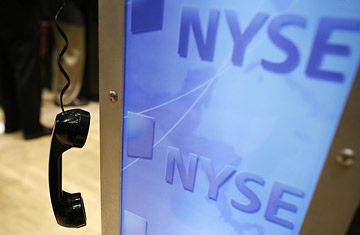
A phone hangs from a terminal on the floor of the New York Stock Exchange
The recovery from the recession looked fine until late last week. Some of the data from the government and associations that keep track of economic indicators got a bit worse. But, that was not the tipping point. What was is when analysts started to take data that was a day or two old and spin it from good to bad. No amount of psychotherapy would break them of the habit of changing their minds so quickly. Fickleness ruined the impression that the financial world was getting better and that by the end of the year GDP would be rising again.
Citigroup (C), Goldman Sachs (GS), and Wells Fargo (WFC) had better-than-expected earnings. The banking sector was supposed to spend the balance of this decade feeling around in the dark and finding nothing but more bad assets and little revenue from what had been an investment banking goldmine fueled by quarters of good M&A and corporate finance results. Citi's numbers beat forecasts but revisionists began to take apart the earnings after the fact. An analyst from Goldman Sachs wrote that the big bank's credit losses are growing at a "rapid rate," meaning the shares remain a "sell." When Bank of America (BAC) released quarterly numbers that were so good that many believed they would save the job of CEO Ken Lewis, JP Morgan responded by releasing an analysis that said banks are likely to realize about $400 billion more in losses on soured assets, requiring further injections of government capital, according to Bloomberg. (See pictures of the Top 10 scared traders.)
Wall St.'s belief about the banks swung 180 degrees in less than a week. The rapid shift of heart took some financial shares down by more than 20% in the first trading day of the week.
The last several weeks have also seen the emergence of the slogan that "things are not getting bad as fast as they were." Some of that relied on slowing weekly unemployment figures and better-than-expected consumer sentiment. For a brief period, all of the statistics on the economy were read as being good. The first set of numbers that let nagging doubt worked its way into optimistic minds was the sharp increase in foreclosure rates. In March there was a 46% increase in filings compared with the same month last year. That news was followed quickly by unexpectedly poor numbers from the Conference Board which said that its index of leading economic indicators fell .3% in March. The Board was probably reluctant to say what it had to, which is that the index is designed to forecast economic activity six to nine months ahead. That news crumpled the hopes of many that the fourth quarter could be the period when the water of the recession would begin to recede.
Now, economists and investors are left with the puzzle of whether the indicators of the last week are an aberration, or were all the figures from January and February?
The answer may be pulled from the three figures about the economy which have the most bearing on how whether recession is beginning to reverse or not. The first is access to credit. To the horror of members of Congress and the governors of the Fed, The Wall Street Journal came out with an analysis showing that the banks which received TARP funds are lending less now than they were before the facility was created as the handiwork of Henry Paulson.
In addition to that, the average number of people applying for unemployment benefits is not improving, and on a rolling average, the figures are getting worse. It is one statistic where the idea of the progress of the problem slowing means nothing. Another person out of a job is a new burden on the government, another blow to the optimism of the general population, and another man or woman who is no longer a consumer and may not be able to make mortgage payments. The pace of that trend does not mean much until net new jobs are being created Third, and finally, real estate prices are falling and the rate at which people are losing homes or are going into default plumbs new depths with each set of new numbers.
If the figures which caused the market to rise and the average person to feel better about his prospects where a short dodge in the wrong direction, the economy will have played a cruel trick. Cruelty and tricks are part of the fiber of daily living at this point, so perhaps the shocks will begin to hurt less.
— Douglas A. McIntyre
Find out 10 things to do with your money.
For constant business updates, go to 24/7wallst.com.
